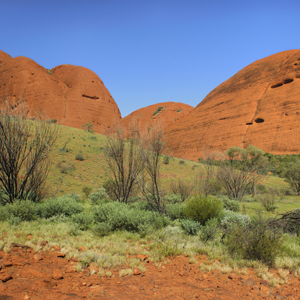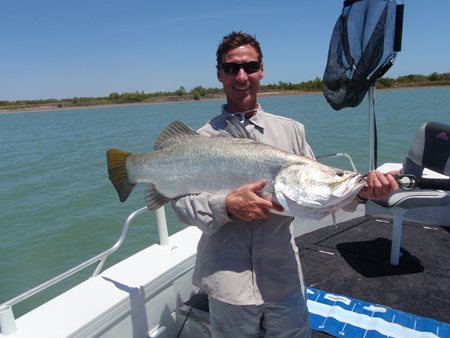Not so grim up North
Cyclone warnings, 80 per cent humidity, salary cuts and crocs. Any one of those things could be enough to turn a lawyer off working in the Top End. But, as Stephanie Quine discovers, there is a rare sense of enthusiasm and ownership over the unique work of lawyers in the sultry centres of Darwin and Cairns, where skilled migrants are flocking and resource projects are booming.

Cyclone warnings, 80 per cent humidity, salary cuts and crocs. Any one of those things could be enough to turn a lawyer off working in the Top End. But, as Stephanie Quine discovers, there is a rare sense of enthusiasm and ownership over the unique work of lawyers in the sultry centres of Darwin and Cairns, where skilled migrants are flocking and resource projects are booming.
When Brian Kelleher moved from his small flat in Vaucluse to the inner suburb of Fannie Bay in Darwin he was shocked to find housing prices comparable to Sydney and humidity that was “the worst thing I’d ever encountered”.
“I thought it was going to be cheap … the builders say there’s cyclone codes which have to be adhered to so the cost of construction is added, plus getting materials here,” says Kelleher, who admits he was initially thinking “what the hell have I done?”, when he moved to Darwin nine months ago.
The wet season, which happens from October to March, has now melted away and Kelleher has become accustomed to the cost of living in the tropical capital, which is smaller than Townsville by population.
Now: “It’s bloody marvellous,” he says, and “making friends, making contacts, is very easy”
“If you’re a professional and you’ve got the right attitude, doors will open to you within a matter of a week. That’s what happened with me; people invited me out to their places after about a week. The lifestyle is very, very good.”
Rushing in, rushing out
Businesses across the board are short of workers in the Territory. Many young people seek the excitement of Sydney, Melbourne and Brisbane. They have their adventure in the Territory and then want to move on.
As the principal migration adviser at Ward Keller Lawyers, a NT firm with offices in Palmerston, Casuarina, Parap, Nhulunbuy and Alice Springs, as well as its head office in Darwin, Kelleher is busier than ever.
“Migration wise it’s just like the old gold-rush days, nobody wants to stay here,” says Kelleher, who has over ten years experience as a migration agent and will soon be admitted to practice in the NT.
Tying to attract skilled workers with families is a huge challenge because of the cost of relocating and the remoteness of Darwin, says Kelleher.
“Despite modern technology there is a real feeling that you are remote here in Darwin,” he says.
But incoming changes to the skilled visa program have seen a strong uptake in the regional sponsored migration scheme - a more flexible scheme designed to attract people to regional areas.

On 1 July Government reforms to the permanent employer-sponsored visa program take effect, making the program more employer focused to allow a quicker response to labour market demand.
“People who want permanent residency are now coming to the Territory and finding employers, and employers love them because they want to stay, and that’s been a big change … for the first time in my career I’m seeing a real uptake in applications and it’s because of what’s happening on 1 July,” says Kelleher.
Brian Kelleher, Ward Keller Lawyers
Many hands make more work
The surge of skilled migration applications can also be put down to the rapid growth phase the NT is experiencing for resource projects.
Projects lawyers are busy with a number of resource developments including the $30 billion construction of a gas pipeline from northwest Western Australia all the way into Darwin harbour by Japanese energy company Inpex.
The LNG project, announced in June last year, is expected to put a lot of pressure on the demand for skilled labour and add around 17 per cent to the GDP of the NT per year, according to the managing partner of Ward Keller, Leon Loganathan.
“It’s being processed 30km away from Darwin city but you can actually see it from the city,” says Loganathan. “A village to house around 3000 workers is also under construction.”
“If you think about the population of Darwin, that’s significant.”
Projects lawyer, and the foundation partner of Minter Ellison’s Darwin office, Cris Cureton, says that the Inpex project will generate work in terms of clearances and “what’s happening with the port development and industries that are being established around the project”.
Minters has also recently done some local clearance work under a UK law firm for the Darwin marine supply base. The consortium lawyers were Freehills but Minters worked on some NT-specific aspects of the project, including property and sacred site clearance, alongside Freehills for one of the consortium members.
“We advised on issues uniquely related to the NT and it can be a very unique place,” says Cureton.
“We tend to have a schizophrenic practice which, because you have a lot of local work, you to have your local network and be established in the NT,” says Cureton.
“Things like native title, where it’s a fairly unique situation, you’ve got to know the land councils and be able to negotiate with them for getting projects through [as they’re] very powerful in that area.”
While firms like Minters do compete with national and international firms for large matters when they arise, Cureton says firms without a presence in the NT sometimes approach Minters for assistance on specific Territory projects.
Mining
Loganathan says that litigation ebbs and flows, but that the firm is expecting “work health” to pick up because of the influx of people coming to work on the Inpex project.
Kevin Stephens is the firms’ top mining lawyer and has a number of clients that are actively involved in exploration and setting up mines.
“He has never not been busy in the whole time that I’ve been here. It’s just been one straight line that keeps going up. [Kevin’s] got three lawyers now working for him in mining which if you think about it, for Darwin, that’s just amazing,” says Loganathan.
It’s a similar story in Cairns, where Andrew Kerr, a partner of Preston Law, hasn’t noticed any slowdown.
“I do work for miners and landholders, I provide my services without fear or favour,” says Kerr, who specialises in mining law, local government and native title and is also the non-executive director of Consolidated Tin Mines Limited.
Kerr’s experience of the day-to-day operational issues that mining companies and landholders face helps him negotiate project deals for mining companies, as well as advise on native title, cultural heritage and landowner compensation.
“To a certain extent it’s become easier to negotiate because everybody’s familiar with the legal framework, but by the same token it’s become more complicated because they’re more aware of the issues that arise in conflicts and all three parties [landholders, miners and native title holders] have become more sophisticated,” says Kerr.
Kerr looks after all of the land and native title matters for Palm Island and recently helped resolve an indigenous land use agreement for the ability to grant residential and commercial leases and leases for other purposes on Palm Island
“That’s part of a long standing Commonwealth commitment to closing the gap and it was one of my major achievements in the last 18 months,” he says, adding that he has tried to engage with the native title parties in Bamaga on the same issues, but has had no luck yet. Andrew Kerr, Preston Law, enjoys the outdoor lifestyle up north
Say you’ll stay
Loganathan says he’s worked hard to build a culture at Ward Keller in which people enjoy working, but that he faces competition for lawyers from the Government and its “large pockets” which can afford to pay “premium sorts of salaries”.
“I think it’s difficult to attract and retain lawyer sanywhere [but] Government has a very large in-house legal team here, it’s probably in excess of ninety lawyers, it’s astounding,” he says, “so it does create a bit of a problem, especially at the mid level.”
Loganathan says his firm “thankfully” hasn’t lost too many lawyers to government. A number of lawyers whose partners are in the defence also practice in Darwin, he says, so lawyers rotate through the capital and stay for four or five years before they’re shifted to another post.
“There’s not much we can do about that,” he adds.
Buzzing tropics
While the Top End might appear to hold a more laid-back lifestyle it certainly doesn’t according to Cureton, who was formerly with Clayton Utz in Sydney.
“You tend to have smaller firms here and, therefore, young lawyers especially, get a lot of client contact and they go and do their own court work a lot earlier than perhaps you’d otherwise do in bigger cities,” he says.
Kelleher says the breadth of work he’s getting is fantastic compared to in Sydney where he used to do “one, maybe two, areas within migration law” because his firm became famous for those areas.
“Here it’s kind of like being a country doctor, whatever whacky thing is walking through the door you’ve got to address it and that’s been the most exciting part,” says Kelleher, adding that there are very few qualified migration agents operating in the NT.
For lawyers like Kelleher the prospect of leaving the Top End for the big smoke is far from their minds.
With Bali only a two-and-a-half hour flight away, Singapore four hours and East Timor 70 minutes, Darwin is a gateway to Asia which allows him to duck away for the weekend and explore.
“The weekend before last I went fishing at Dundee beach which is west of Darwin, it’s bloody beautiful, the weekend before I was at Katherine Gorge, this weekend I’m at Uluru, I’m just loving it,” he says.
Crocodiles, sharks and manta rays are also frequently sighted “playing in the water”, says Kelleher.
“I think they’ve found about 180 crocs in Darwin harbour in the past year, rangers have just trapped them and they just move them on … it’s all good fun.”
Loganathan worked in Sydney with Ernst and Young for six years and “loved it” but says he finds it
“just so much more invigorating being up here”.
“You can achieve and accomplish so much more because there are more opportunities,” he says.
The structure of the society is not as developed so lawyers can, for example, start a migration practice, he says.
“If you’re working for a southern firm there’s much more resistance to changing the mix of the firms whereas up here its more agile, you can respond to things more quickly … If you’ve got a bit of get- up-and-go, and you’ve got some knowledge behind you, you can rise to the top pretty quickly,” says Loganathan.
Kerr, who took a $9000 pay cut when he decided on a large regional Cairns firm over a major Brisbane CBD firm for his first job, says he has an affinity for regional places where he believes the people are more down to earth.
“I love the tropics; before I did my law degree I did a science degree in marine biology,” says Kerr, “the only thing I miss is the surf.”
But in place of good breaks, Kerr has a few good running tracks, from Croydon township up to Lake Belmore, and some fishing holes out around Karumba, a small town in the Gulf of Carpentaria where Kerr often travels for work.
Tim Dobinson, a fellow partner at Preston, says Kerr’s practice is the one “we all envy and aspire to”.
“He spends more time out in the Gulf of Carpentaria and Cape York fishing than working,” jokes Dobinson.
While his salary might have taken a cut initially, Kerr and lawyers like him working in the Top End trade off some big city swagger for the dynamics of closer-knit communities and the natural beauties of Australia’s tropical north and its nearby island neighbours.
With the same quality of work available and career progression prospects on par, if not better, than those in major CBD firms, crocs sound almost charming and an annual monsoon season invigorating in the busy markets of Darwin and Cairns.








